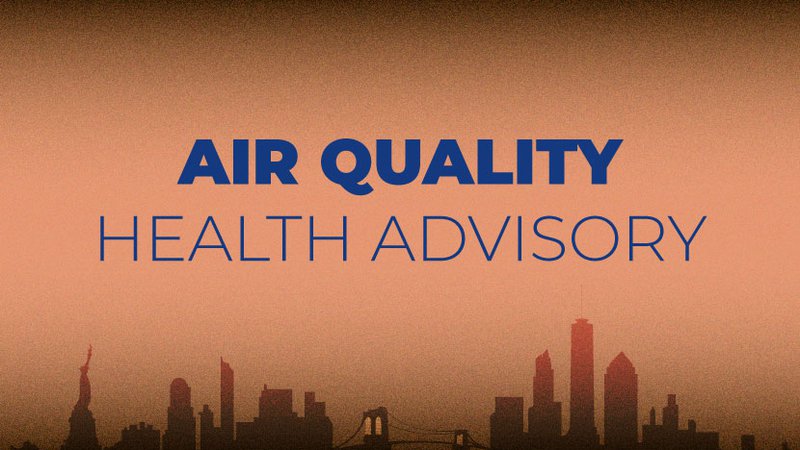Updated July 8, 2024
In June of 2023, New York City experienced some of the worst air quality in the world because of wildfire smoke originating in Canada. The recent anniversary of this unprecedented disaster is an opportunity for New Yorkers to learn how to take precautions when an Air Quality Health Advisory is in effect, including by finding safety advice in your language.
Depending on current Air Quality Index (AQI) levels, those with pre-existing cardiac or respiratory conditions should take particular caution, and children and older adults should also be especially careful.
When the air quality is compromised, New Yorkers can consider taking the following precautions:
Precautions
- Remain indoors as much as possible.
- Close the windows in your home and ensure they are sealed.
- Wear a high quality, well-fitting mask, such as an N95 or a KN95, when outdoors. One day use is recommended; after one day, discard the mask. The CDC provides guidance on proper N95 usage and fit.
- If you need to go outside, prioritize eye protection. Consider wearing protective eyewear, like goggles or wraparound glasses or sunglasses. Maintain good hygiene by washing your hands and avoid touching your eyes, especially if you wear contact lenses (wearing eyeglasses is a better option). Lubricating eye drops and artificial tears are recommended.
- If available, use air purifiers indoors for at least 48 hours (HEPA filters recommended). Humidifiers can also help capture air particles.
- If you do not have an air purifier, you can make a DIY air purifier at home. There are many ways to do this; one option for a DIY air purifier is a Corsi-Rosenthal box; you can also find instructions for a DIY air filter fan. The EPA provides safety recommendations for creating a DIY filter, as well as advice on maintaining clean air indoors.
- If you have an air conditioner, close the fresh air intake to prevent outdoor air from entering your home. Be sure to replace or clean washable filters often.
- Keep your pet safe by closing windows and using air filters or purifiers. Limit walks outside. After a walk, wipe your pet’s muzzle, feet, and coat with a damp cloth. Call your vet if you notice any unusual symptoms or behavior (from NYC Emergency Management).
- Stay informed: Sign up for Notify NYC to receive emergency alerts about air quality, available in 14 languages and ASL. Visit nyc.gov/notifynyc, follow NYC Emergency Management on Twitter, or contact 311 to sign up to receive customized emergency notifications. New Yorkers can also download apps like: IQAir AirVisual Mobile App; AirNow Mobile App; PurpleAir Mobile App; and the BreezeoMeter Mobile App.
- If you have concerns about the air in your home, or cannot access an indoor space, consider visiting a Clean Air Center or a public library. Check New York Public Library locations to ensure your nearest library is open; check Brooklyn Public Library locations; check Queens Public Library locations.
Health Risks
Smoke inhalation can cause immediate symptoms, including:
- Coughing, difficulty breathing, wheezing, or asthma attacks
- Stinging eyes
- Scratchy or irritated throat and runny nose
- Irritated sinuses
- Headaches and Migraines
- Fatigue
- Chest pain and fast heartbeat
- Young people and older adults, First Responders, people with asthma, Chronic Obstructive Pulmonary Disease (COPD), or heart disease, or who are pregnant are especially at risk.
Call 911 if you are having trouble breathing. Call your healthcare provider if you have asthma, heart disease or another health condition that is getting worse. Learn more about Air Quality and Health, and learn about Low Cost Care options in New York City.
Connect for Resources
For assistance with emergency preparedness and resources, please feel welcome to reach out to our office for support. Call 212-669-7250 or email GetHelp@advocate.nyc.gov.
During an emergency, call or text 911.
By Deputy Public Advocate of Infrastructure & Environmental Justice Kashif Hussain and Deputy Digital Media Director Mirielle Clifford
